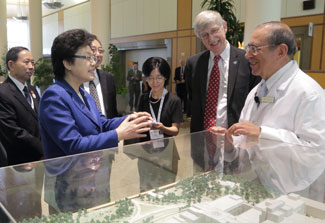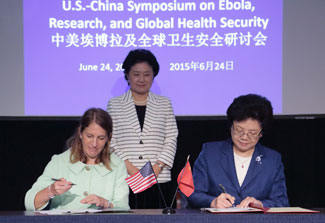US-China renew commitment to global health security
July / August 2015 | Volume 14, Issue 4
Ebola and global health security were on the agenda at a meeting of U.S. and Chinese health officials held on the NIH campus in June. Both countries agreed to renew a longstanding commitment to collaborate on the prevention, detection and response to global infectious disease outbreaks.

Photo by Ernie Branson for NIH
A high-level Chinese delegation visited NIH recently to discuss
global health security. Minister Li Bin (left) also toured the Clinical
Center, guided by NIH Director Dr. Francis Collins (center) and CC
Director Dr. John Gallin (right).
"With each day, the distances between us shrink," U.S. Health and Human Services (HHS) Secretary, Sylvia M. Burwell, told participants. "Our world grows more interconnected. As we are seeing now with MERS-coronavirus, our borders will not stop diseases, and evolving health threats require coordinated responses. Our global health community needs global health solutions. And we know that none of us can operate in isolation, especially when it comes to the health of our people." Read the Secretary's full remarks.
The Chinese delegation was led by Vice Premier Liu Yandong and included Minister Li Bin, of the National Health and Family Planning Commission, and Dr. Wang Yu, Director of China's CDC. NIH Director Dr. Francis S. Collins also participated.
Burwell thanked the Chinese visitors for the important contributions their country made to the Ebola response. The close partnership between U.S. and Chinese staff in the mobile lab China sent to Sierra Leone played an important role in saving lives and turning the tide of the epidemic, Burwell said.
The two countries were among the first to respond to the outbreak. The U.S. sent surveillance teams, established treatment facilities and deployed thousands of public health experts. China mounted its largest-ever overseas global health effort - delivering medical supplies, deploying clinical and public health experts, and building laboratory and clinical facilities.

Photo by Ernie Branson for NIH
Chinese Vice Premier Liu Yandong watches HHS Secretary Burwell
and Minister Li renew an agreement promoting closer cooperation,
scientific discovery, capacity building, and exchange of information
in the field of infectious diseases.
Both countries are committed to supporting the Global Health Security Agenda, an effort to accelerate progress toward a safe and secure world free from infectious disease threats. Burwell noted U.S. and Chinese scientists have also worked together to help stop the spread of SARS and bird flu, as well as to combat cancer, HIV/AIDS and other diseases. In addition, the NIH is currently hosting more than 700 Chinese scientists in its Bethesda labs.
Both sides agree it's a priority to continue to build the global infrastructure for health, Burwell said. "Challenges will continue to threaten the health and security of our nations," she said. "But with better strategies and a strong partnership, we can be ready to face whatever comes our way, and better deliver for the people we serve."
More Information
To view Adobe PDF files,
download current, free accessible plug-ins from Adobe's website.